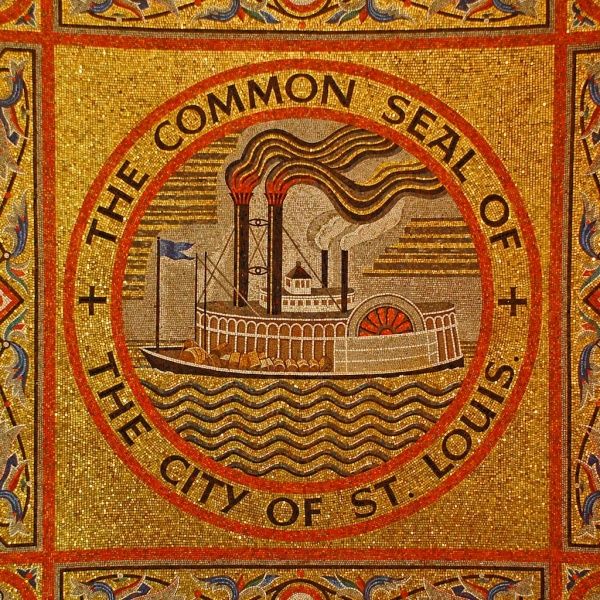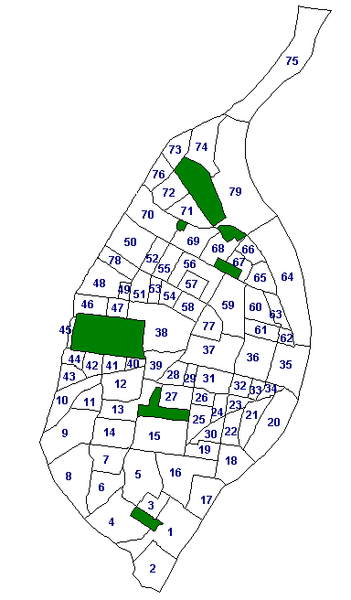Saint Louis: Difference between revisions
(→100px) |
|||
| Line 118: | Line 118: | ||
* -- [[Shriners Hospital]] <br> | * -- [[Shriners Hospital]] <br> | ||
* -- [[Central Institute for the Deaf]] <br> | * -- [[Central Institute for the Deaf]] <br> | ||
* -- [[Sportsman's Park]] <br> | |||
== '''Maps''' == | == '''Maps''' == | ||
Revision as of 19:39, 13 April 2014
Quote
"Every one soon or late comes round by Rome."---Robert Browning
Appearance
== Climate ==
St. Louis lies in the transitional zone between the humid continental climate type and the humid subtropical climate type, with neither large mountains nor large bodies of water to moderate its temperature. It is subject to both cold Arctic air and hot, humid tropical air from the Gulf of Mexico. The city has four distinct seasons. Spring is the wettest season and produces severe weather ranging from tornadoes to winter storms. Summers are hot and humid; temperatures of 90 °F (32 °C) or higher occur 43 days a year.
Fall is mild and sunny, with lower humidity and can produce intermittent bouts of heavy rainfall, with the first snow usually falling around December 4th. Winters can be brisk and stimulating, however extended periods of very cold temperatures are rare; high temperatures below freezing occur fewer than 25 days per year, on average. While each winter typically has at least one major snowstorm accumulating 4 inches or more, it typically rains more often than it snows during St. Louis winters, however, winter is the driest season. Winter storm systems, such as Alberta clippers and Panhandle hooks, can bring heavy freezing rain, ice pellets, and snowfall, typically followed by a few days of clear but very cold weather. Daily high temperatures during winter average about 45 degrees, however, so accumulated snow typically melts quickly. Along with much of the country, St. Louis' winters appear to be warming in recent decades. Over the last 20 winter seasons, 10 of those winters were among the top 20 warmest, but only 2 were among the top 20 coldest, as measured by number of heating degree days.
The average annual temperature recorded at nearby Lambert–St. Louis International Airport, is 57.1 °F (13.9 °C), and average precipitation is about 41.0 inches (1,040 mm). The daily average temperature in July is 80.0 °F (26.7 °C), while in January it is 31.8 °F (−0.1 °C), although this varies from year to year. Both 100 °F (38 °C) and 0 °F (−18 °C) temperatures can be seen on an average 2 or 3 days per year. The official record low is −22 °F (−30 °C) on January 5, 1884, although there were unofficial readings of −23 °F (−31 °C) on January 29, 1873; and the record high is 115 °F (46 °C) on July 14, 1954.[21] July 2012 was the hottest month in the 138-year recorded weather temperatures in St. Louis history starting in 1874, with an average daily temperature of 88.1 °F (31.2 °C).
Winter (December through February) is the driest season, with an average 7.5 in (191 mm) of precipitation. The average seasonal snowfall is 18.2 inches (46 cm). Given a typical 10:1 ratio of snow depth to water contained within the snow, this means that roughly 5.7 of the 7.5" in precipitation each winter is in the form of rain. Spring (March through May), is typically the wettest season, with 11.7 in (297 mm) of precipitation. Dry spells lasting one to two weeks are common during the growing seasons.
St. Louis has thunderstorms 48 days a year on average. Especially in the spring, these storms can often be severe, with high winds, large hail and tornadoes. Lying near the hotbed of the Tornado Alley, St. Louis is one of the metropolitan areas with most frequent tornadoes. The area has an extensive history of damaging tornadoes.
Some late autumns feature the warm weather known as Indian summer; some years see roses in bloom as late as early December.
Economy
History
Exploration and Louisiana before 1762
The history of St. Louis, Missouri began with the settlement of the St. Louis area by Native American mound builders who lived as part of the Mississippian culture from the 800s to the 1400s, followed by other migrating tribal groups. Starting in the late 1600s, French explorers arrived, and after the French and Indian War, a French trading company led by Pierre Laclede and Auguste Chouteau established the settlement of St. Louis in February 1764.
City founding and early history: 1763–1803
The city grew in population due to its location as a trading post on the Mississippi River, and the city played a small role in the American Revolutionary War. In 1803, the city and the region were sold to the United States as part of the Louisiana Purchase.
Expansion, growth, and the Civil War: 1804–1865
After the transfer, St. Louis was an entrepôt of trade with the American West. In the late 1840s, it became a destination for German and Irish immigrants; in response, some residents adopted nativist sentiments. The city's proximity to free states caused it to become a center for the filing of freedom suits, such as the Dred Scott case, whose outcome was among the causes of the American Civil War. During the Civil War, St. Louis had a small skirmish on its outskirts, but remained under Union control.
Fourth city status: 1866–1904
Its railroad connections and industrial activity increased after the war, and it experienced a corresponding rise in pollution. During the early 1870s, the Eads Bridge was constructed over the Mississippi River, and the city established several large parks, including Forest Park. Due to local political and economic disputes, the city separated from St. Louis County in 1876 and became an independent city. During the late 19th century, St. Louis became home to two Major League Baseball teams, while both ragtime and blues music flourished in the city. It hosted the 1904 World's Fair and the 1904 Summer Olympics.
Decline of the inner city and urban renewal: 1905–1980
St. Louis did not escape the Great Depression and its high unemployment. During World War II the city hosted war industries that employed thousands of workers. After the war, suburbanization and outward migration significantly reduced the city's population, and efforts at urban renewal such as the Gateway Arch were relatively unsuccessful. Among the unsuccessful efforts was the notorius Pruitt–Igoe public housing project.
End of the Last Century: 1980 to 1999
Starting in the 1980s and continuing into the following century, construction and gentrification increased in St. Louis, particularly downtown. City beautification and crime reduction made progress, although St. Louis continued to struggle with crime and perceptions of crime.
The New Millennium
The city saw modest population growth during the mid-2000s, but showed a steep decline in the 2010 U.S. Census.
Location
Population
- City (318,172) - 2012
- Metro Area (2,795,794.) - 2012
Arenas
Attractions
Bars and Clubs
Castles
- -- Jonathan O. Pierce House (AKA: Cracker Castle)
- -- South Saint Louis County -- Castle
Cemeteries
City Government
Churches
Crime
Citizens of the City
Current Events
Galleries
Hospitals
St. Louis is a center of medicine and biotechnology. The Washington University School of Medicine is affiliated with Barnes-Jewish Hospital, the fifth largest hospital in the world, and the two institutions operate the Alvin J. Siteman Cancer Center. The School of Medicine also is affiliated with St. Louis Children's Hospital, one of the country's top pediatric hospitals. Both hospitals are owned by BJC HealthCare. The school's Genome Sequencing Center played a major role in the Human Genome Project.
St. Louis University Medical School is affiliated with Tenet Healthcare's St. Louis University Hospitals and SSM Health Care's Cardinal Glennon Children's Hospital. It also has a cancer center, vaccine research center and a bioethics institute. Several different organizations operate hospitals in the area, including BJC HealthCare, SSM Health Care, Tenet and Mercy Healthcare.
There is also the St. Louis Psychiatric Rehabilitation Center which sits on a hill along Arsenal street.
Hotels & Hostels
Hypermarkets
Landmarks
- -- Chain of Rocks Bridge
- -- Chain of Rocks Park
- -- Eads Bridge
- -- James Clemens House
- -- Shriners Hospital
- -- Central Institute for the Deaf
- -- Sportsman's Park
Maps
Les Gens Des Ténèbres
- -- Roman Chalkeski
- -- Ted the bartender at the Corviales Club
- -- Jan Marko Police Detective with the STLPD
Monasteries
Monuments
Jefferson National Expansion Memorial
Museums
Neighborhoods
List of neighborhoods
The following is a list of neighborhoods of the city of St. Louis, Missouri.
Parks
There are 111 parks in the city of St. Louis.
Forest Park
O'Fallon Park
Fairground Park
Carondelet Park
Private Residences
Restaurants
Ruins
Schools
Shops
Theatres
Transportation
Vampires of the City
- -- Assamite
- -- Brujah
- -- Gangrel
- -- Giovanni
- -- Lasombra
- -- Malkavian
- Raleigh Montgomry: Senechal Malkavian
- Raleigh Montgomry: Senechal Malkavian
- -- Nosferatu
- -- Ravnos
- -- Toreador
- -- Tremere
- -- Tzimisce
- -- Ventrue
Websites
Chat
Hey Keith!














